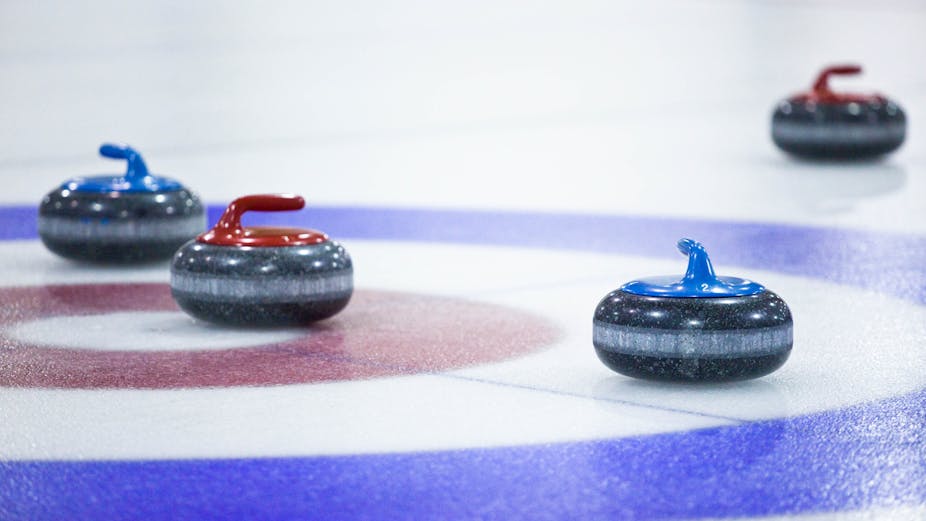Jenny Jones’ bronze medal in the women’s snowboard slopestyle has rekindled excitement in Britain for the Sochi games following much controversy over the cost and human rights and security fears in Russia. Jones’ success is Britain’s first ever medal on snow. Ice has been the traditional field of triumph with our last two golds coming from the skeleton in 2006 and curling in 2002.
Curling continues to be a key constituent of Britain’s medals hopes. Both the men’s and women’s curling teams are strong contenders for a spot on the podium. After investing £14m, more than double spent on preparations for the 2010 Vancouver Winter Olympics, Liz Nicholl, UK Sports chief executive, has said: “If we achieve three that is hugely significant.” The official target is three to seven medals. But curling represents more than just Britain’s medal hopes, it has an important function in society – something that’s worth remembering in the politics surrounding the games.
Sporting politics
All major sporting events convey political messages as they have from Vancouver to Sochi, South Africa to Brazil where the FIFA World Cup will take place this summer. On Friday David Cameron and Alex Salmond contested the politics of London 2012 and the upcoming 2014 Commonwealth Games in Glasgow. Speaking from the Olympic Park, Cameron made a plea to keep the red, white and blue of Team GB together.
Politics should not crowd out other stories about the way in which sport works for society. Similarly, a narrow focus on the economic cost and return of sport is unfortunate – because stories about how sport can make a difference to communities sometimes get lost. With around 30% of team GB in Sochi being Scottish, there is a smaller yet significant story to tell about Scottish curling and its place in society.
Scottish curlers have played a significant part in Team GB over the years which makes the sport unique – and they have contributed disproportionately to our haul of Winter Olympic gold medals. Meanwhile in an era when the legacies from major sporting events are contested, softer legacies from sports such as curling are not insignificant.
Both the men’s and the women’s curling teams competing in Sochi are composed entirely of Scots. The 2014 Sochi “chef de mission” to Team GB is Mike Hay, a medal-winning former curler who was coach to the GB women’s curling team skippered by Rhona Martin (a Scot) that won the 2002 gold in Salt Lake City – the first gold for Team GB since Torvil and Dean’s Sarajevo triumph in 1984.
Scotland’s roarin’ game
The importance of curling past and present to Scotland should not be underestimated. In an era when the legacies attached to major sporting events are often questioned, curling’s legacy is as a hub of activity for communities north and south, both men and women, rural and urban. The associational bonds of friendship and community forged through curling can be more important than the economic return. These bonds cross generations as expertise and knowledge is passed on from generation to generation or community to community.
As Daniel Tarschys, former secretary-general of the Council of Europe, points out: “The hidden face of sport is the tens of thousands of enthusiasts who find in sport a place for meeting and exchange.” He viewed sport as “training ground for community life or the ideal school for the making of democracy”. This is perhaps something that is only realised when small rinks are threatened with closure to make way for bigger more commercial city-based rinks.
Curling’s pedigree in Scotland pre-dates the first ever Winter Olympic Games. Known as the “Roarin’ Game” because of the sound the stones make on the ice, the origins of curling are debated but it is one of at least four sports that Scotland has a cultural right to fight over. Stirling’s Smith Art Gallery and Museum claim to have the world’s oldest curling stone, which dates back to 1511.
At one time, curling was the most popular sport in Scotland – more popular even than football. The Royal Caledonian Curling Club, given the royal charter in 1843, grew from 28 affiliated clubs and 893 members in 1838 to 465 affiliated clubs and more than 18,000 members in 1888. Today there are still more than 150 curling clubs in Scotland.
The game has produced a host of songs that add further testament to its place in Scottish communities. As weather permitted a comprehensive system of curling ponds or “bonspiels” existed prior to the development of indoor links. Grand matches of curlers started in 1847 with the last recorded match consisting of more than 2,500 curlers taking place in February 1979.
Legacies from Scotland to Sochi should not just be measured in medals. Success is not just cost per medal but also the social networks, friends and associations the sports like curling spawn. This is where our focus should be in lending our support to Team GB on its Olympic endeavour.

